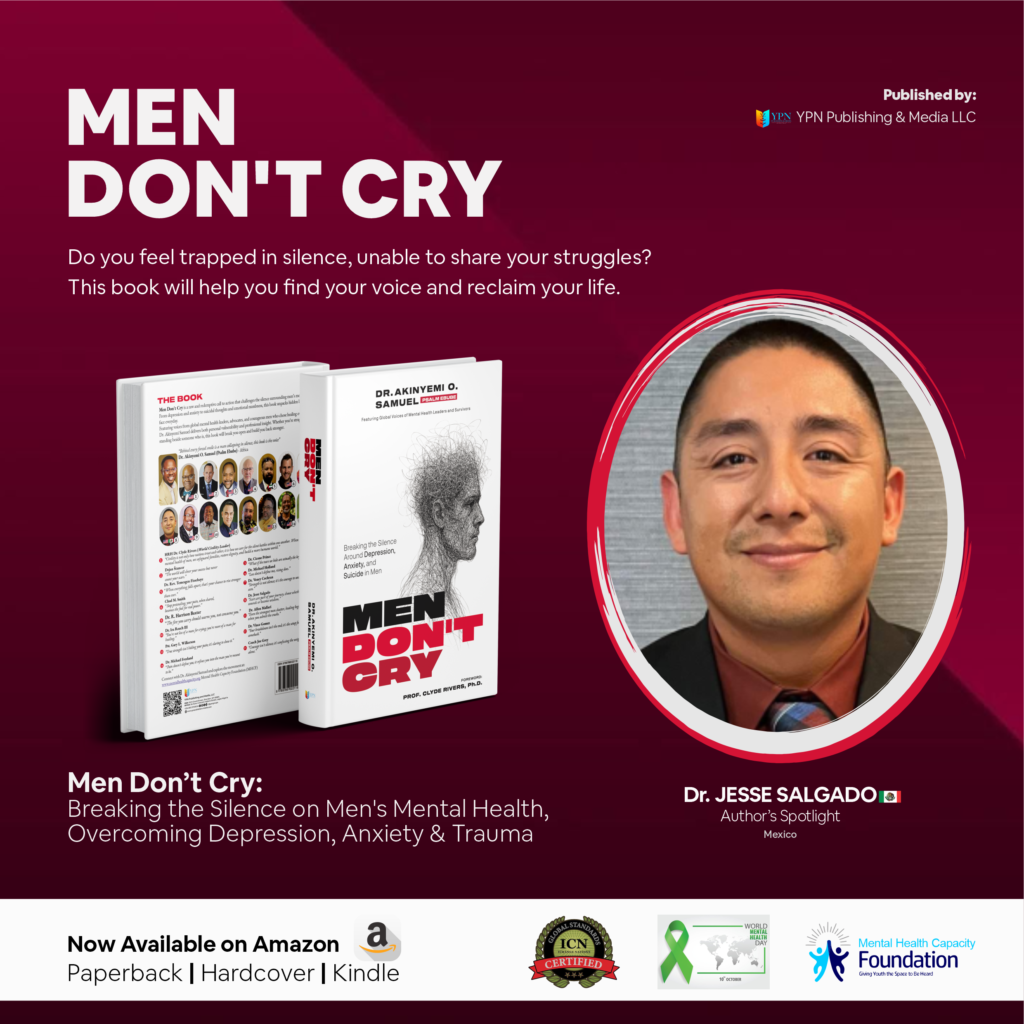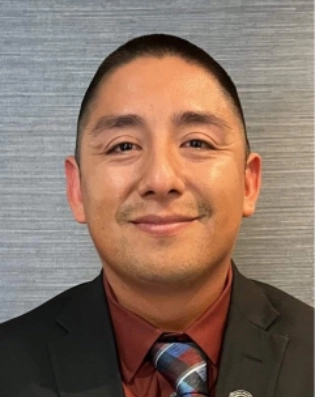Sheridan, USA October 04, 2025 Innovation Times Senior Correspondent
On October 10, the world will come together to observe World Mental Health Day, a day dedicated to raising awareness and challenging the stigma that still surrounds mental well-being. This year’s theme, Breaking the Silence: Men’s Mental Health and Access to Care in Times of Crisis, strikes at the heart of one of society’s most urgent yet often overlooked issues. Among the voices contributing to this dialogue, Dr. Jesse Salgado stands out. His chapter “Whispers of Pain” in the transformative book Men Don’t Cry has already begun to change the way readers view the hidden struggles men carry.
Dr. Salgado opens his chapter with a truth that is both poetic and piercing: “Scars are part of your journey, choose whether they stay wounds or become wisdom.” It is a statement that reframes pain not as a permanent sentence but as a choice of transformation. This perspective alone has the power to shift how men see themselves and their struggles.
For generations, men have been taught to equate strength with silence. They have been told to endure without complaint, to mask fear, grief, and even trauma under the guise of toughness. Dr. Salgado challenges that narrative, illustrating that silence does not heal. Instead, silence allows pain to fester until it manifests in depression, anxiety, and sometimes the most tragic outcome of all: suicide.
“Whispers of Pain” is not a story of despair, but of survival, healing, and resilience. Dr. Salgado acknowledges that pain is unavoidable, but he insists that the tools we use to face it are what determine whether it will destroy us or refine us. He writes not only from professional knowledge but from personal experience. His words carry the weight of someone who has seen lives shattered by untreated pain, and also the hope of someone who knows that healing is possible.
The chapter explores the dual nature of pain. It can elevate or destroy. It can be the foundation of wisdom or the breeding ground for despair. Dr. Salgado explains how feelings of being undervalued, misunderstood, or invisible often lead men into a downward spiral. He notes that prolonged neglect of these feelings may open the door to depression, a condition that if left untreated can escalate to suicidal thoughts.
The power of this chapter lies in its honesty. Dr. Salgado does not minimize the severity of men’s struggles. He names them clearly. He describes the invisible wounds carried by soldiers who return from war only to battle demons no one else sees. He reflects on the friends he has lost to suicide, and the countless men who quietly give up while appearing strong on the outside. These stories remind us that behind every stoic face may lie a storm of silent suffering.
Yet, at its core, “Whispers of Pain” is about tools. Tools to face depression. Tools to cope with trauma. Tools to rewrite one’s narrative. Dr. Salgado reminds readers that while depression can feel like a life sentence, it is not one. With the right tools, recovery is not only possible but sustainable.
Importantly, he emphasizes that no single tool works for everyone. Men must adapt strategies to their unique lives and circumstances. He rejects one-size-fits-all advice and instead calls for individualized approaches that respect each man’s journey. This humility and realism make his writing not only relatable but deeply trustworthy.
As a mental health professional and survivor of his own hardships, Dr. Salgado embodies the very wisdom he shares. He shows that scars need not remain open wounds. They can become markers of resilience and sources of strength, but only if we confront them and refuse to let silence be the final word.
In a world that often glamorizes grinding through adversity without complaint, “Whispers of Pain” is a necessary counter-voice. Dr. Salgado reminds men that while discipline and hard work are important, survival is not enough. Life must be lived fully, with joy, authenticity, and community. To settle for mere survival is to forfeit the richness that life can offer.
The urgency of his message cannot be overstated. Across the globe, men are dying in silence. Suicide rates among men remain disproportionately high. Untreated depression robs families of fathers, husbands, brothers, and friends. Yet too often, society overlooks these losses because men are expected to be unbreakable. Dr. Salgado breaks this dangerous myth wide open.

At this year’s World Mental Health Day summit, his presence will undoubtedly resonate with men and women alike. His chapter is not just literature but a blueprint for a cultural shift. It calls on men to unlearn harmful lessons of silence and toughness, and to embrace vulnerability as a pathway to true strength.
For readers, “Whispers of Pain” offers not only insight but also practical empowerment. It reassures men that their struggles are neither invisible nor shameful. It challenges families and communities to look more closely and listen more deeply. It compels health systems to provide real access to care, especially during crises.
Dr. Salgado’s voice is firm but compassionate. He does not condemn men for wearing masks of strength. Instead, he understands why those masks exist and gently shows the cost of keeping them on too long. His words are a lifeline to anyone who has ever felt crushed by expectations, ignored in their suffering, or lost in despair.
Every paragraph of “Whispers of Pain” carries a subtle but urgent plea: do not wait until it is too late. Do not wait until silence becomes unbearable. Do not wait until pain becomes permanent. The time to speak, to share, and to heal is now.
This chapter stands as a reminder that scars, while inevitable, are not the end of the story. They can be rewritten into testimonies of survival. They can become wisdom that guides not only the man who carries them but the generations that follow.
Reading Men Don’t Cry is more than purchasing a book. It is an investment in humanity, in the dismantling of stigma, and in the possibility of change. Dr. Salgado’s contribution ensures that this work will remain a touchstone in the ongoing conversation about men’s mental health.
For men standing at the edge of silence, this book may be the light that pulls them back. For communities unsure how to respond, it is the education they need. For families grieving losses that might have been prevented, it is a call to action.
As World Mental Health Day approaches, the importance of listening to voices like Dr. Jesse Salgado’s cannot be overstated. His chapter challenges us to reimagine strength, not as stoicism but as the courage to confront pain openly and transform it into wisdom.

Readers who wish to experience “Whispers of Pain” and the wider collection of voices in Men Don’t Cry can find the book in multiple formats:
Scars will always remain, but as Dr. Salgado writes, the choice lies in whether they remain wounds or become wisdom. This October 10, as the world gathers to break the silence around men’s mental health, his words could not be more vital.
ABOUT THE AUTHOR
Dr. Jesse Salgado is an advisor, consultant, international best-selling author, and personal assistant to HRH Dr. Clyde Rivers. With over 15 years of hands-on experience in construction, rising from entry-level to foreman, he has earned a reputation as a respected leader who trains, mentors, and empowers others to reach their potential. Driven by a passion for personal growth and leadership, Dr. Salgado specializes in Chaplain Civility Dialogue and is a Certified Master Civility Practitioner, holding certificates in Pastoral Studies and Chaplaincy from UGCSI, along with an Honorary Doctorate in Philosophy in Humanities. His books, including The Mechanics of the Heart, Every Day with God, and Adventures of My Scars, reflect his commitment to guiding others toward resilience and self-belief.
Recognized globally, Dr. Salgado has received the World Civility Award and was named a Civility Ambassador by iChangeNations. Through his teaching, writing, and humanitarian service, he continues to inspire individuals and communities, emphasizing unity, empathy, and the power of mindset. He leads by example, showing that true leadership is rooted in service, integrity, and the ability to uplift others, leaving a lasting impact wherever he goes.



